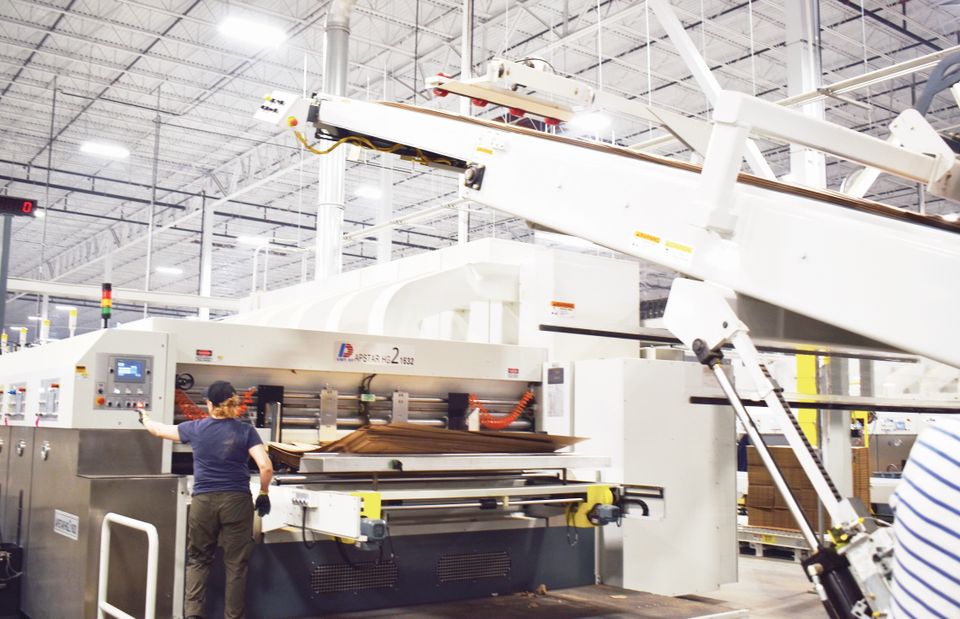Photos and Article By Laura Walter
A cardboard box. It’s perhaps the most basic tool for shipping and shopping. And this essential product is now manufactured full-time in Dover.
The Delmarva Corrugated Packaging factory broke ground in January 2021, had a roof by July and was live by October. Their “breakneck pace” was aided by swift builders and suppliers. And the local economic incentives led the owners to choose Central Delaware.
Their massive facility stands on a fresh-cut 37.4-acre site at 1601 POW-MIA Parkway. It’s the kind of place where a person loses count of how many high school football stadiums would fit inside. And, yes, it’s all dedicated to the creation of cardboard.
All projects start with the 425-foot-long corrugator, a massive line of machinery that weaves flat paper into thick, scalloped cardboard. The assembly line itself is wide enough (over 9 feet) that two smaller jobs can be completed side-by-side, simultaneously. (That’s wider than the company’s previous equipment in New Jersey.) The maximum speed is 1,500 feet per minute.
“When it’s really cranking, if this machine was running north, we could run a web to Boston in 24 hours,” said COO/President Jeff Coleman.
The cardboard is then moved into the assembly lines: the four converters (a fifth is coming in spring of 2022) are almost completely automated. Corrugated blanks are shuffled through the system for ink design, cutting, stacking and shipping. Coleman points out a machine that can process about 2,400 pieces — or one truckload — in one hour. Nearby, newly-cut box flats are zipping down an assembly line, turned, stacked, counted and heaved out of sight.
In fact, automation will do even more of the heavy lifting soon: a computer will direct the series of modular conveyer belts to automatically load the different boards onto separate production lines, for separate projects.
“Once all of the conveyer is installed … they will then be able to activate a [simulated] system, so when the corrugated board comes off the corrugator, that system will know that ‘this order for Pepsi is in conveyor line Number 2,’” Coleman explained.
Employees have a good chance at career growth in light industrial manufacturing, compared to a job in, say, warehouse fulfillment (which has many employees, but perhaps lower pay for packing purchases into a box. “We have less traffic and better pay,” said Andreas Akaras, the company’s counsel for economic initiatives and special projects. Corrugated employees can learn skills that “get them to the next level. After working with us, someone like a Tesla would be interested in working with them.”
This technology means “manufacturing is not backbreaking anymore,” said Akaras. “They’re not walking around with wrenches” to tweak the controls for each job. Now they work with computer systems to adjust settings.
For supplies, a railroad spur will pull train cars directly into the building, and 30 dock doors are ready to truck products out. Wastewater from the corrugator and ink presses are treated on site. By spring, the factory is aimed to produce 23 to 25 truckloads of product daily. Six months later, that could double. The max capacity is 70 trailer loads daily.
The principal and mastermind behind the company, Dennis Mehiel, has built other paper companies from scratch and sold them, including Box USA and then U.S. Corrugated. He held onto Kampack Inc. in Newark, N.J., until closing it and transferring operations into the new Delmarva Corrugated Packaging company.
“The site in Newark had served him very well. However, it was landlocked,” with little room to expand, Coleman said. Plus, all the new state-of-the-art corrugating and cutting machinery is roughly 30 to 60 percent larger than the older technology, he said.
Delmarva Corrugated Packaging is an independent producer; since it’s not tied to a particular paper mill, they can order paper from various sellers.
“The paper solutions that we choose to service the poultry industry is completely different [from] the beverage industry,” Coleman said. “Most of the vertically integrated guys, they make the paper and the box. It’s one-size-fits-all. … So we’re able to find the best value per pound of fiber, which is a benefit to us, and we pass that benefit on to our customers.”
“Everything and anything you can think of comes in corrugated [packaging],” said Ed Fisch, a designer.
There are different boxes for copier paper, tomatoes, raw chicken, apples, mushrooms and beer. Does the box need a waxy or laminate covering for cold, damp or grease resistance? Will it hold abrasive or corrosive materials? How high, and for how long will the boxes be stacked in storage? Does it need one or two layers of corrugation?
“And the business is so robust right now it’s remarkable. In 43 years, I’ve never seen it like this. I call it the ‘Sadie Hawkins boon’” because businesses that need shipping supplies “have been remarkably receptive to us. … Now more often than not, the girls are asking us to the dance,” Coleman said.
E-commerce is driving the clamor for cardboard. Companies used to ship a box full of calculators to the local department store. Now, individuals buy a single calculator online, and it ships in its own box. Nowadays, each product requires more cardboard than previously.
This business is like an infrastructure project: “Not only is it a big business and we expanded the road and brought rail to the building, [but] boxes are part of the infrastructure of the economy,” said Akaras. When the COVID-19 pandemic began, “it became imminently apparent that we needed boxes to move things around safely … it’s a key component to logistics, which is infrastructure. It’s actually serving an important need in the region which we believe has been underserved.”
The factory is just minutes from a neighborhood of new houses, plus the Kraft Heinz plant.
“I think we’re gonna be good neighbors in the community as we get our roots established,” Coleman said. “I think people are going to see we’re a good organization to be engaged with.”

